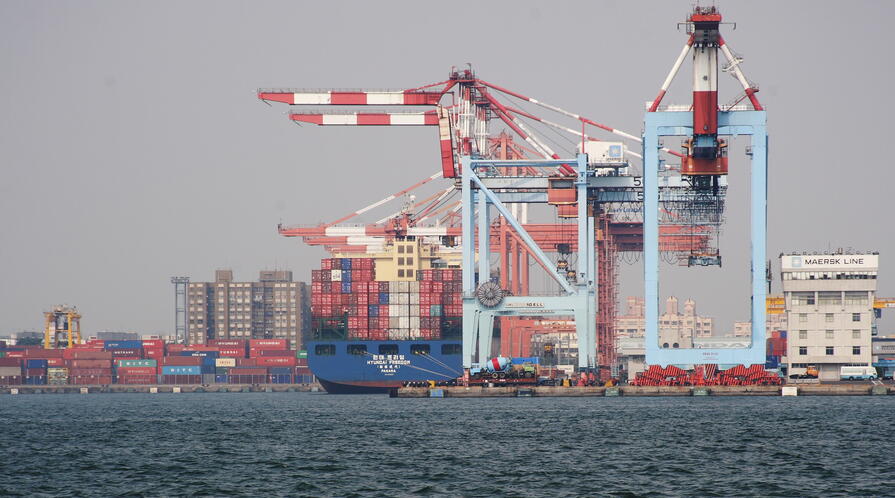Human rights experts weigh in on Syria conflict
On November 10, CDDRL and the WSD Handa Center for Human Rights and International Justice welcomed Human Rights Watch's Director of Emergencies Peter Bouckaert and Sareta Ashraph, senior analyst on the UN Commission of Inquiry on the Syrian Arab Republic, for a discussion on the ongoing human rights and refugee crises in Syria. The talk was moderated by Stanford Law School's Beth Van Schaack, Leah Kaplan Visiting Professor in Human Rights.
Photo Album

Russia seeks to demonstrate military prowess in Syria, CDDRL scholar says
In a recent piece with Stanford News, FSI Senior Fellow Kathryn Stoner remarks on recent Russian military interventions in the Syrian conflict, suggesting that this re-engagement with the Middle East is a signal to Western powers of Putin's aim to become a global power. To read more, please click here.

Where's Taiwan on the Trans-Pacific Partnership?
With the announcement on Monday that an agreement has been reached on the Trans-Pacific Partnership (TPP), the controversial trade accord is in the news all across Asia this week. Taiwan is not one of the founding participants, but its leaders have reiterated their determination to join the next round of negotiations if the agreement is ratified and comes into effect. Taiwan's prospects for entry remain uncertain, however, and will depend to a great degree on the attitudes of decision-makers in the United States and the People's Republic of China.
The Taiwan Democracy Project (TDP) at the Center on Democracy, Development, and the Rule of Law has been at the forefront of research and discussion on this topic. In the fall of 2013, the TDP held a conference to explore the prospects for Taiwan’s participation in the TPP that brought together policymakers and scholars from Taiwan along with with leading specialists from other Asian countries and the U.S. The key findings of the conference are summarized in a conference report. The key conclusions of the conference remain valid today: it is in Taiwan's national interest to join the TPP; external obstacles to Taiwan's accession to the partnership are signficant but not insurmountable; and Taiwanese policy-makers need to worry about domestic obstacles as much as international ones in seeking TPP membership.
The Taiwan Democracy Project will continue to monitor TPP-related developments over the coming months and plans to revisit Taiwan's prospects for TPP entry in a symposium in February 2016.

Of Paradigms, Politics and Principles: The 2016 Taiwan Elections and Implications for China’s Security Strategy and Cross-Strait Relations
Sponsored by the Taiwan Democracy Project and the U.S. Asia Security Initiative at the Asia-Pacific Research Center (APARC)
Abstract
During the recent meeting between PRC President Xi Jinping and Taiwan President Ma Ying-jeou, the “1992 One China Consensus” served as a mutually acceptable paradigm for maintaining “peaceful and stable” conditions across the Taiwan Strait. For Xi Jinping, the warmth of the visit thinly veiled a message to Taiwan’s leaders and electorate, as well as to onlookers in Washington. Chinese officials and media clearly link the talks and confirmation of the 1992 Consensus to “the great rejuvenation of the Chinese nation”—a concept that is increasingly unpalatable to many in Taiwan. Xi hopes to keep DPP presidential candidate Tsai Ing-wen (and perhaps even future KMT leaders) in the 1992 Consensus “box” and to co-opt the U.S. in this effort, but perhaps underestimates the political transformation underway on Taiwan.
The Xi administration has also hardened its position regarding “core interests” such as Taiwan, embodied in a “bottom line principle” policy directive that eschews compromise. Although many commentators and most officials across the region have shied away from stating that the PRC and Taiwan are at the crossroads of crisis, the collision of political transformation on Taiwan and the PRC’s “bottom line principle” will challenge the fragile foundations of peaceful cross-Strait co-existence. Changes in the regional balance of military power brought about by a more muscular People’s Liberation Army compounds the potential for increased friction, providing Beijing with more credible options for coercion and deterrence.
This talk will consider the politics and principles involved in cross-Taiwan Strait relations in light of the upcoming 2016 Taiwan elections and the policies of the Xi Jinping administration; and will discuss some of the possible implications for China’s national security policy, regional stability, and the future of cross-Strait relations.
Bio

The Possible Approaches for Defusing Tensions in the South China Sea: A Taiwanese Perspective
In this talk, Wellington Shih will provide a historical and legal overview of the Republic of China’s territorial claims in the South China Sea. He will also review the latest developments in the ongoing dispute between the People’s Republic of China, the ROC on Taiwan, and other claimants in the region, including the Philippines, and discuss the South China Sea Peace Initiative proposed by the administration of President Ma Ying-jeou.
Taiwan's National Security and the Trans-Pacific Partnership: The International Law Dimension
Abstract
The Trans-Pacific Partnership (TPP) is widely regarded as the economic component of the US strategy of “rebalance” to Asia. As a major trading partner of many of the founding members, Taiwan has obvious economic and security interests at stake and is therefore seeking to join the TPP in the next round. But an overlooked aspect of the TPP for Taiwan is its potential impact on sovereignty. Trade agreements provide a revealing window into the evolving conceptions of modern sovereignty. The way Taiwan’s unique form of statehood and international status is defined in trade agreements could strengthen its position under international law and contribute to its national security. This talk will consider how Taiwan was defined as a sui generis legal entity in its application to join the World Trade Organization (WTO) and as a party to the Cross-Straits Economic Cooperation Framework Agreement (ECFA), with lessons for future negotiations to join the TPP.
Speaker Bio

This event is hosted by the Taiwan Democracy Project.







